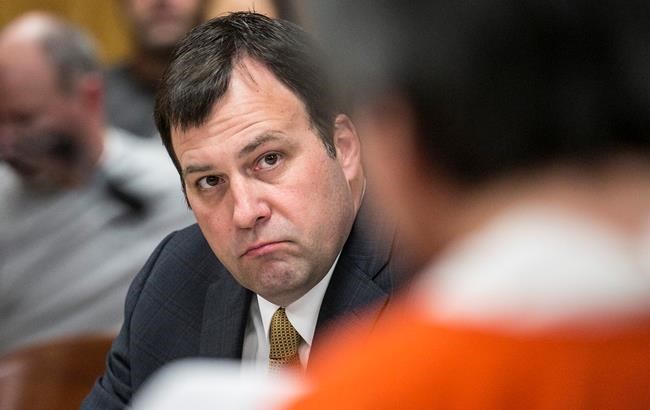
FILE - Sedgwick County District Attorney Marc Bennett looks toward Daniel Perez as Perez is sentenced in Sedgwick District Court in Wichita, Kan., on March 24, 2015. Bennett said this week that the state's "stand your ground law" prevented him from charging the local juvenile center's employees in the death of 17-year-old Cedric Lofton, who'd been restrained on the ground on his stomach, shackled and handcuffed for more than 30 minutes.(AP Photo/The Wichita Eagle, Mike Hutmacher, File)
Republished January 21, 2022 - 1:54 PM
Original Publication Date January 21, 2022 - 1:06 PM
TOPEKA, Kan. (AP) — Kansas lawmakers were thinking of homeowners facing down burglars and people attacked on the street when they wrote a “stand your ground” law more than a decade ago allowing use of deadly force in self defense. They didn't envision it applying to police officers, jail guards or government employees.
Now even some Republicans in the GOP-controlled Legislature who support the idea behind the law want to revisit it. The reason: A prosecutor said this week that it prevented him from criminally charging employees of a juvenile intake center in Wichita in the death of a Black teenager who'd been restrained on the ground on his stomach, shackled and handcuffed for more than 30 minutes.
Police took 17-year-old Cedric Lofton to the center after a foster care agency said he needed a mental health exam for increasingly erratic behavior.
Sedgwick County District Attorney Marc Bennett said any criminal charges were likely to be dismissed by a judge because Bennett concluded that the juvenile center's employees believed they were acting in self-defense during the Sept. 24 altercation with Lofton. He said that Kansas courts have expanded self-defense rights to the point that, “How could any cop ever be prosecuted, then, for shooting somebody?”
While other legal experts and supporters of the law don't think Bennett is correct, critics of stand your ground laws in about 30 states say they're increasingly being used by law enforcement to shield officers who use deadly force.
“I don’t know how you apply stand your ground to that scenario,” said Senate President Ty Masterson, a Wichita-area Republican who voted in 2010 for the law currently on the books. “It's meant to be for self-defense, to allow you to protect yourself.”
Kansas lawmakers focused on the self-defense rights of private individuals in a 2010 version. The votes for the law were unanimous, with Democratic Gov. Laura Kelly and Republican Attorney General Derek Schmidt voting yes as state senators.
Kansas House Speaker Ron Ryckman Jr., a Kansas City-area Republican, said Bennett's comments quickly prompted a discussion among GOP committee chairs about the law, and "I thought we'd take a look at it.”
A House committee is preparing to examine Lofton's case as early as next week, and Ryckman said, “I’m assuming that stand your ground will come up."
The Kansas law eliminated people's duty to retreat before using deadly force against attackers when they believe it's “necessary to prevent imminent death or great bodily harm” to themselves or others. Another section grants them immunity from criminal prosecution or civil lawsuits.
The law wasn't meant to apply to cases like Lofton's, said spokesperson John Milburn, a spokesperson for Schmidt, who helped draft it and is now running against Kelly in this year's race for governor. Kelly declined to comment Friday when asked about Bennett's comments.
Milburn said that after years of judicial decisions on the stand your ground law and others on self-defense, “It may be prudent for the legislature to review all of them to ensure they are being interpreted and are working as intended.”
Robert Spitzer, professor emeritus of political science at the State University of New York, Cortland, whose research focuses on gun policy and politics, called Bennett's conclusion in the Lofton case “a perfectly logical application” of the stand your ground laws that demonstrates why they're problematic. He is the author of a book, "Guns Across America: Reconciling Gun Rules and Rights.”
State Rep. JoElla Hoye, a Kansas City-area Democrat and a gun safety activist, said she's working on legislation to revise the law. But no measure has a chance without Republican support, making Ryckman's interest crucial.
Kansas Republicans' interest in reviewing the law won't necessarily prompt a lessening of “Stand Your Ground” protections in a GOP-leaning state where strong support for gun rights is a political obligation in many areas. Nationally, experts said they don't know of a case of a state backing off, and in 2017, Florida legislators strengthened their state's law.
Lofton's case is not the first in which Bennett has cited the Stand Your Ground law in not filing a criminal charge. Last May, he announced he wouldn't file charges against a Kansas sheriff’s deputy who fatally shot an unarmed woman who refused to pull over during a high-speed police chase.
Nor is Bennett alone among prosecutors in invoking the law.
In Johnson County in the Kansas City area, District Attorney Steve Howe cited the law in 2018 in declining to charge an Overland Park police officer for fatally shooting a 17-year-old boy who was backing out of his family’s driveway.
Howe said in 2017 that the Legislature needed to re-examine the law. Bennett also has been arguing as much for at least several years.
“What I find irritating or when I have a hard time masking my irritation is when there’s something going on for 10 years and suddenly people are angry about it,” Bennett said. “Like, where you been?”
___
Hollingsworth reported from Mission.
___
Follow John Hanna on Twitter: https://twitter.com/apjdhanna
News from © The Associated Press, 2022